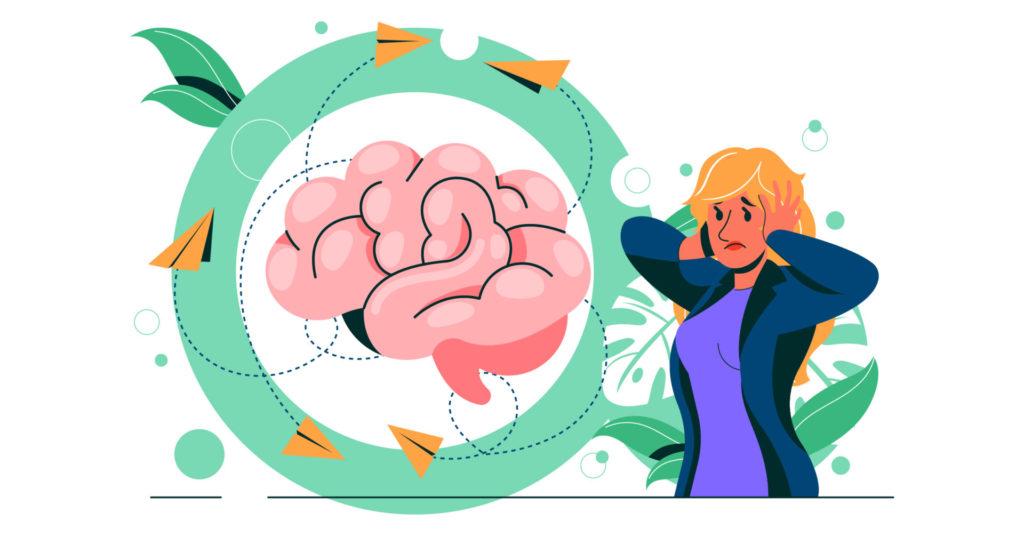Overview
Major or mild frontotemporal neurocognitive disorder refers to symptoms considered to be overlapping syndromes present with major or mild neurocognitive disorders (impairments in cognitive functioning due to underlying disorders, commonly Alzheimer’s, Dementia, Parkinson’s, etc.)
The disorder mainly affects middle-aged adults, though there have been cases of individuals ranging from ages 30-90.
Due to the progressive nature of the disorder, the symptoms occur and gradually worsen, and there is usually a significant gap between onset of the disorder and consults with healthcare professionals. Life expectancy is reportedly between 6-11 years after onset, and 3-4 years after diagnosis.
There are two subtypes of frontotemporal neurocognitive disorder: the behavioral variant, affecting behavior, and the language variant, affecting language.
These symptoms are caused by brain atrophy or underlying neurological disorders. The language variant contains further classifications:
- Nonfluent/Agrammatic (errors in speech and grammar)
- Semantic (difficulty in comprehension, object identification and naming, etc.)
- Logopenic (lack of words)
Diagnosis is heavily reliant on clinical evaluation as well as brain imaging technology. Treatment for the disorder focuses strongly on managing symptoms as they progress, with a heavy emphasis on behavioral therapy as well as education and support for caregivers.
Signs and Symptoms
Major or mild frontotemporal neurocognitive disorder can have behavioral or language oriented symptoms.
Behavioural Variant
- Loss of interest in socialization, self-care or personal responsibilities
- Changes in social style
- Changes in religious or political beliefs
- Changes in eating patterns and hyperorality
- Loss of sympathy and empathy
- Indifference towards other people
- Hoarding
- Verbally or physically repetitive behaviors
- Binge eating
- Loss of insightfulness and poor judgement
- Loss of executive functioning such as planning and problem-solving skills
Language Variant
- Difficulty in expressing oneself
- Having a hard time naming things
- Speech lacks proper grammar
- Hesitant, slow and effortful speech
- Loss of the ability to recognize, comprehend, and retrieve words
- Difficulty in reading and writing
- Reduced attention capacity
- Inability to plan
Individuals who experience symptoms of either variant are eligible for diagnosis of major or mild frontotemporal neurocognitive disorder, though most individuals experience symptoms of both variants.
Risk Factors
The presence of major or mild frontotemporal neurocognitive disorder is often seen as a precursor to or a cause of early-onset neurocognitive disorders (such as Alzheimer’s or Dementia) in individuals who are under 65 years of age, 60% of whom are diagnosed between the ages of 45-64.
Behavioral variants are seen predominantly in males while language variants are seen predominantly in females.
Genetic factors are the only known correlates of major or mild frontotemporal neurocognitive disorder, with an estimated 40% of individuals with the disorder having a family history involving it.
10% of individuals showed a genetic pattern wherein the condition could have a 50% chance of being passed from parent to child.
Diagnosis
The diagnosis of mild or moderate frontotemporal neurocognitive disorder is heavily dependent on the fulfilment of the outlined criteria for the behavioral or language variants, along with thorough assessment on the basis of comprehensive clinical history, physical examinations such as neurological and mental status assessments, and targeted laboratory testing.
The presence of a major or mild neurocognitive disorder is a prerequisite for diagnosis.
Neuroimaging such as CT scans or MRIs help to determine a diagnosis by focusing on atrophy in regions typically present in cases of the disorder, and also helps find genetic variants.
Neuropsychological evaluation is especially important as it can highlight significant impairment of frontal lobes even in the absence of memory and perceptual problems.
A diagnosis of probable major or mild frontotemporal neurocognitive disorder may be made when there is no evidence of a present genetic variant or abnormal involvement of frontotemporal regions.
When it is not possible to carry out these procedures, the diagnosis is dependent on clinical reports of behavior and language changes.
Speculations of the presence of major or mild frontotemporal neurocognitive disorder should be considered in cases of disinhibition in middle age, progressive and unexplainable communication or language problems, and patients presenting with neurocognitive impairment (as well as symptoms such as falls, motor neuron disease, etc.).
Other neurocognitive disorders are common differential diagnoses, although emerging biomarkers for Alzheimer’s may help rule it out, and in the case of Parkinson’s, spontaneous symptoms occur prior to cognitive decline. Neurological conditions, mental disorders, or medical conditions may also be underlying causes of symptoms.
Treatment
The treatment for major or mild frontotemporal neurocognitive disorder focuses on identification and management of symptoms, rather than obstructing the progression of the disorder.
While no systematic trials have been carried out with regards to therapeutic or other non-pharmacological modes of treatment, behavior management therapy is the mainstay in handling symptoms.
In cases of the behavioral variant, socially disruptive behaviors, impaired judgement and impulsiveness need to be monitored and appropriate interventions can be carried out.
Engaging in previous hobbies can act as distractions from disruptive behavior, while limitations may need to be put in place to discourage impulsive activities (such as limiting access to money to prevent financial recklessness).
Due to the lack of sympathy and empathy, dealing with behavioral variants of the disorder can be distressing for the caregivers, and thus seeking counselling, support groups, and cognitive behavioral therapy can be helpful, and caregiver education is a necessity in order to understand and adapt to behavioral changes.
Maintaining logs of behavioral symptoms to share with the consulting healthcare professional can be effective on the part of the caregivers.
In cases of the language variant, speech and language therapy may be effective in the initial stages.
There is currently no approved medication for the treatment of major or mild frontotemporal neurocognitive disorder, and any pharmacological treatment usually targets symptoms of comorbid neurocognitive or psychiatric disorders.
Pharmacotherapy involving antidepressants, antipsychotics, stimulants, and other various classes of medication may be implemented in order to manage behavioral symptoms, although such treatments are mainly investigative.
Differential Diagnosis
1. Other neurocognitive disorders: Other neurodegenerative diseases may be distinguished from major or mild frontotemporal NCD by their characteristic features. These diseases include NCD due to Alzheimer’s disease, Lewy bodies and Parkinson’s disease.
2. Other mental disorders and medical conditions: Behavioral-variant major or mild frontotemporal NCD may be mistaken for a primary mental disorder, such as major depression, bipolar disorders, or schizophrenia, and individuals with this variant often present initially to psychiatry. Over time, the development of progressive neurocognitive difficulties will help to make the distinction
Specialists
Primary care physicians may refer geriatric psychiatrists, geriatricians, or neurologists to confirm a prospective diagnosis upon initial assessment of symptoms.
Further, the respective specialist may also collaborate with the primary healthcare provider in terms of coordinating symptom management, providing education and support to caregivers, as well as consulting with primary clinicians with regards to progress of the disorder.
In conclusion
A set of neurological conditions that primarily affect the frontal and temporal lobes of the brain are together referred to as frontotemporal dementia. These brain regions are frequently linked to personality, conduct, and language.
Frontotemporal dementia does not currently have a known cause or effective treatment. Frontotemporal dementia patients don’t seem to benefit from medications intended to treat or delay the progression of Alzheimer’s disease, and some of these medications may even make their symptoms worse.
However, some drugs and speech therapy can be used to treat frontotemporal dementia symptoms.
Contact Ananda’s professionals for further diagnosis.





